Related Research Articles
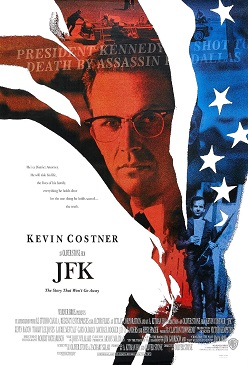
JFK is a 1991 American epic political thriller film written and directed by Oliver Stone and starring Kevin Costner as Jim Garrison leading along with an ensemble of casts. The film examines the investigation into the assassination of John F. Kennedy by district attorney Jim Garrison, who came to believe there was a conspiracy to assassinate Kennedy and that Lee Harvey Oswald did not act alone. The film features performances from Tommy Lee Jones, Gary Oldman, Sissy Spacek, Kevin Bacon, and Joe Pesci. The film also features supporting performances from Laurie Metcalf, Donald Sutherland, Jack Lemmon, Walter Matthau, Michael Rooker, Ed Asner, Brian Doyle-Murray, John Candy, Beata Poźniak, Wayne Knight, Jay O. Sanders, Vincent D’Onofrio, Sally Kirkland, and Martin Sheen.

The President's Commission on the Assassination of President Kennedy, known unofficially as the Warren Commission, was established by President Lyndon B. Johnson through Executive Order 11130 on November 29, 1963, to investigate the assassination of United States President John F. Kennedy that had taken place on November 22, 1963.
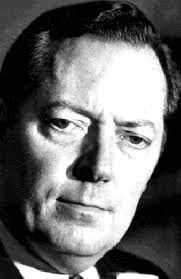
James Carothers Garrison was the District Attorney of Orleans Parish, Louisiana, from 1962 to 1973. A member of the Democratic Party, he is best known for his investigations into the assassination of John F. Kennedy and the prosecution of New Orleans businessman Clay Shaw to that effect in 1969, which ended in Shaw's acquittal. He authored three books, one of which became a prime source for Oliver Stone's film JFK in 1991, in which Garrison was portrayed by actor Kevin Costner, while Garrison himself also made a cameo as Earl Warren.
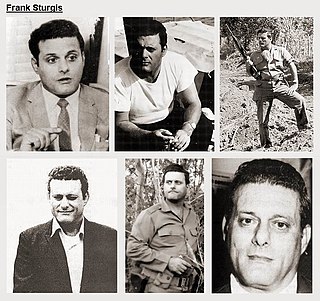
Frank Anthony Sturgis, born Frank Angelo Fiorini, was one of the five Watergate burglars whose capture led to the end of the presidency of Richard Nixon. He served in several branches of the United States military and in the Cuban Revolution of 1958, worked as an undercover operative for the Central Intelligence Agency, and was alleged to be involved in the JFK assassination.

On November 22, 1963, John F. Kennedy, the 35th president of the United States, was assassinated while riding in a presidential motorcade through Dealey Plaza in Dallas, Texas. Kennedy was in the vehicle with his wife, Jacqueline, Texas Governor John Connally, and Connally's wife, Nellie, when he was fatally shot from the nearby Texas School Book Depository by former U.S. Marine Lee Harvey Oswald. The motorcade rushed to Parkland Memorial Hospital, where Kennedy was pronounced dead about 30 minutes after the shooting; Connally was also wounded in the attack but recovered. Vice President Lyndon B. Johnson assumed the presidency upon Kennedy's death.

Everette Howard Hunt Jr. was an American intelligence officer and author. From 1949 to 1970, Hunt served as an officer in the Central Intelligence Agency (CIA), particularly in the United States involvement in regime change in Latin America including the 1954 Guatemalan coup d'état and the 1961 Bay of Pigs invasion. Along with G. Gordon Liddy, Frank Sturgis, and others, Hunt was one of the Nixon administration "plumbers", a team of operatives charged with identifying government sources of national security information "leaks" to outside parties. Hunt and Liddy plotted the Watergate burglaries and other clandestine operations for the Nixon administration. In the ensuing Watergate scandal, Hunt was convicted of burglary, conspiracy, and wiretapping, eventually serving 33 months in prison. After release, Hunt lived in Mexico and then Florida until his death.
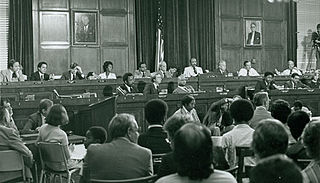
The United States House of Representatives Select Committee on Assassinations (HSCA) was established in 1976 to investigate the assassinations of John F. Kennedy and Martin Luther King, Jr. in 1963 and 1968, respectively. The HSCA completed its investigation in 1978 and issued its final report the following year, which concluded that Kennedy was probably assassinated as a result of a conspiracy. In addition to now-discredited acoustic analysis of a police channel dictabelt recording, the HSCA also commissioned numerous other scientific studies of assassination-related evidence that corroborate the Warren Commission's findings.

Clay LaVergne Shaw was an American businessman, military officer, and part-time contact of the Domestic Contact Service (DCS) of the CIA. Shaw is best known for being the only person brought to trial for involvement in the assassination of John F. Kennedy. Shaw was acquitted in 1969 after less than one hour of jury deliberation, but some conspiracy theorists continue to speculate on his possible involvement.
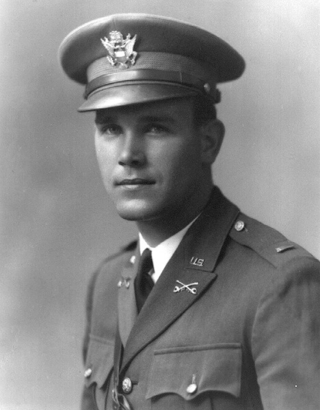
Leroy Fletcher Prouty served as Chief of Special Operations for the Joint Chiefs of Staff under President John F. Kennedy. A colonel in the United States Air Force, he retired from military service to become a bank executive. He subsequently became a critic of U.S. foreign policy, particularly the covert activities of the Central Intelligence Agency (CIA), which he believed was working on behalf of a secret world elite.
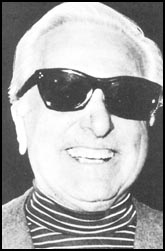
John"Handsome Johnny"Roselli, sometimes spelled Rosselli, was a mobster for the Chicago Outfit who helped that organization exert influence over Hollywood and the Las Vegas Strip. Roselli was recruited by the Central Intelligence Agency (CIA) in a plot to assassinate Cuban leader Fidel Castro.
History's Mysteries is an American documentary television series that aired on the History Channel.
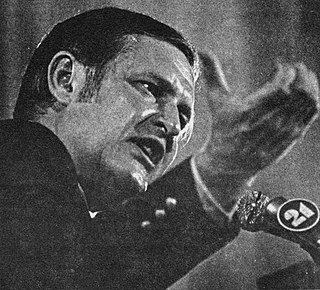
Jack Northman Anderson was an American newspaper columnist, syndicated by United Features Syndicate, considered one of the founders of modern investigative journalism. Anderson won the 1972 Pulitzer Prize for National Reporting for his investigation on secret U.S. policy decision-making between the United States and Pakistan during the Indo-Pakistani War of 1971. In addition to his newspaper career, Anderson also had a national radio show on the Mutual Broadcasting System, acted as Washington bureau chief of Parade magazine, and was a commentator on ABC-TV's Good Morning America for nine years.
David Sánchez Morales was a Central Intelligence Agency operative who worked in Cuba and Chile.
The John F. Kennedy assassination and the subsequent conspiracy theories surrounding it have been discussed, referenced, or recreated in popular culture numerous times.

Salvatore Mooney Giancana was an American mobster who was boss of the Chicago Outfit from 1957 to 1966.
The CIA Kennedy assassination is a prominent John F. Kennedy assassination conspiracy theory. According to ABC News, the Central Intelligence Agency (CIA) is represented in nearly every theory that involves American conspirators. The secretive nature of the CIA, and the conjecture surrounding high-profile political assassinations in the United States during the 1960s, has made the CIA a plausible suspect for some who believe in a conspiracy. Conspiracy theorists have ascribed various motives for CIA involvement in the assassination of President Kennedy, including Kennedy's firing of CIA director Allen Dulles, Kennedy's refusal to provide air support to the Bay of Pigs invasion, Kennedy's plan to cut the agency's budget by 20 percent, and the belief that the president was weak on communism.

The assassination of President John F. Kennedy on November 22, 1963 spawned numerous conspiracy theories. These theories allege the involvement of the CIA, the Mafia, Vice President Lyndon B. Johnson, Cuban Prime Minister Fidel Castro, the KGB, or some combination of these individuals and entities. The original FBI investigation and Warren Commission report, as well as an alleged "benign CIA cover-up", have led to the claim that the federal government deliberately covered up crucial information in the aftermath of the assassination. Former Los Angeles District Attorney Vincent Bugliosi estimated that a total of 42 groups, 82 assassins, and 214 people had been accused at one time or another in various conspiracy scenarios.
Lamar Waldron is an American writer and historian who often writes about conspiracies and cover-ups.

Conspiracy theories about the assassination of Martin Luther King Jr., a prominent leader of the civil rights movement, relate to different accounts of the incident that took place on April 4, 1968, in Memphis, Tennessee. King was assassinated on the balcony of the Lorraine Motel, the day after giving his final speech "I've Been to the Mountaintop". Claims soon arose over suspect aspects of King's assassination and the controversial role of the alleged assassin, James Earl Ray. Although his guilty plea eliminated the possibility of a trial before a jury, within days, Ray had recanted and claimed his confession was forced. Suspicions were further raised by the confirmation of illegal surveillance of King by the FBI and the CIA, and the FBI's attempt to prompt King to commit Suicide.
References
- ↑ Smith, Liz (March 15, 2006). "JFK assassination gets another look". The Blade. Toledo, Ohio. p. D-3. Retrieved March 4, 2013.